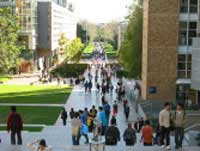Photov & Renewable Energy Eng - 1655
Program Summary
Faculty: Faculty of Engineering
Contact: http://www.eng.unsw.edu.au
Campus: Sydney
Career: Research
Typical Duration: 4 Years
Typical UOC Per Semester: 24
Min UOC Per Semester: 12
Max UOC Per Semester: 24
Min UOC For Award: 144
Award(s):
Doctor of Philosophy (Research)
View program information for previous years
Program Description
As a general guide, the UNSW entry requirements for the degree of Doctor of Philosophy are as follows:
- A candidate for the degree shall have been awarded an appropriate degree of Bachelor with Honours from the University of New South Wales or a qualification considered equivalent from another university or tertiary institution at a level acceptable to the Research Committee of the appropriate Faculty.
- Candidates may be admitted to the PhD program after one year’s full-time enrolment in a Masters by Research program, with the approval of the Faculty Postgraduate Affairs Committee.
- In exceptional cases an applicant who submits evidence of such other academic and professional qualifications as may be approved by the Committee may be permitted to enrol for the degree.
English language requirements also apply. Please see: GRS
Program Objectives and Graduate Attributes
Research topics are available covering a broad range of the photovoltaic and renewable energy sectors. Topics include:
- Selective emitter, buried contact and other commercial silicon wafer solar cells
- Ink-jet printing technology for high efficiency solar cells
- Light trapping in thin crystalline silicon
- N-type wafer solar cells
- Photovoltaic device and material characterization
- Photovoltaic module design
- Photovoltaics in developing countries
- Screen-printed solar cells
- Semiconductor device modeling
- Silicon photonics
- Silicon wafer solar cells
- Thin-film crystalline silicon photovoltaic devices
- Third generation photovoltaics
- Combustion modelling
- Wind and solar energy forecasting
- Efficiency of energy use
- Renewable energy systems
- Renewable energy policy.
Program Structure
The length of a doctoral thesis normally should not exceed 100,000 words of text and should be submitted for examination within 4 years of full-time study.
Students may also be required to complete some prescribed advanced coursework. This should be negotiated with a student's supervisor.
Academic Rules
Fees
Further Information
Prospective students are strongly advised to make contact with potential supervisors before applying for research study at the University.
Please refer to the home page of the School of Photovoltaic and Renewable Energy Engineering for contact details of prospective supervisors Homepage
Please refer to the following web-page for further information on how to apply, scholarships, English language requirements, thesis preparation and other research related matters: Future Students
Area(s) of Specialisation









